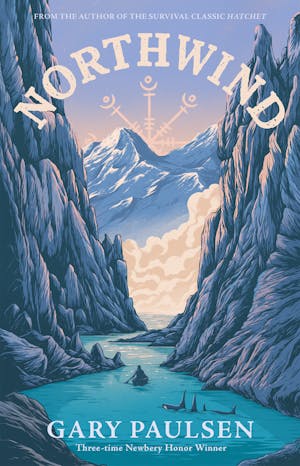The Saga of Sea Child
AND IT CAME TO PASS HE WAS BORNE OF A WOMAN OF THE SEA,
BORNE OF A SEA WOMAN, WITH A BLOOD CLOT HELD TIGHTLY
IN HIS T|NY FIST.
Å SIGN.
A SIGN TO TELL, TO TELL OF HARDSHIP AND DANGER IN THE LIFE TO COME,
TO COME, FROM THE TINY FIST AND CLOT.
AND THE MOTHER, OF NO REMEMBERED NAME, DID DIE BIRTHING THE BOY
AND THE FATHER, ALSO OF NO REMEMBERED NAME,
HAD PASSED TO VALHALLA FIGHTING A WHALE.
AND AS THERE WAS NO OTHER NAMED FAMILY
THE BOY WAS BORN AN ORPHAN.
ALONE.
TO LIVE ALONE ON THE DOCKS, A DOCK BOY, A WHARF BOY, NURSED BY SUCKING RAGS DIPPED IN SOUR GOAT’S MILK AND FISH OIL,
FED ON SCRAPS OTHERS WOULD CHEW TO SOFTEN,
DRESSED IN YET MORE RAGS WITH CRUDELY CARVED WOODEN SHOES,
ALWAYS HALF NAKED.
HE WAS THAT BOY.
THAT BOY.
AND THEY CALLED HIM THE WHARF RAT AND NAMED HIM LEIF
FOR NO OTHER PERSON ON THOSE DOCKS HAD THAT NAME.
AND WHEN HE WAS OLD ENOUGH TO WALK THEY TOOK HIM ON THE BOATS.
FOR ALL HIS YOUNG LIFE HE WAS PASSED FROM ONE BOAT TO THE NEXT, TO THE NEXT, TO THE NEXT.
NO LONGER THE WHARF RAT NAMED LEIF BUT A BOAT RAT NAMED LEIF.
AND WHEN HE COULD USE HIS HANDS THEY SET HIM TO REPAIRING NETS,
SEWING RIPPED NETS, TORN CLOTHING, AND SHARPENING THE SEAL-KILLING HARPOONS,
BEATING HIM WITH WOODEN RODS IF HE DID THEM WRONG.
AND THEY MADE HIM COOK GREASY EEL MEAT THAT THE SAILORS WOULD EAT,
CLAIMING IT WAS SOFT AND WOULD BE EASY TO PUKE WHEN THEY BECAME SEASICK.
ACROSS ONE OCEAN, INTO ANOTHER OCEAN, THEN NORTH LOOKING NOT FOR WHALES—
WHICH WERE TOO HARD TO KILL—BUT FOR SEALS, FOR THEIR GREASE-MEAT AND FURS.
ALWAYS AFTER FURS.
FOR SEAL FURS SHINED LIKE GOLD PIECES.
ALWAYS NORTH, WHERE THE SEAL FUR WAS THICKEST AND MADE FOR BETTER WARMTH.
AND THE BOY GREW AND WAS FIVE SUMMERS, THEN SIX, THEN EIGHT, AND TEN,
AND TWELVE SUMMERS, TAKEN ON ONE BOAT, THEN ANOTHER AND ANOTHER, UNTIL WHEN HE SLEPT IN HIS DREAM STORY IT SEEMED LIKE ALL ONE OCEAN,
AND WHEN HE CAME AWAKE IT STILL SEEMED LIKE ONE OCEAN JUST AS ALL BOATS SEEMED LIKE ONE BOAT AND ALL EEL MEAT—WHICH HE LEARNED TO PUKE—
SEEMED LIKE ONE MEAT AND ALL PUKE SEEMED LIKE ONE PUKE
AND ALL BEATINGS SEEMED LIKE ONE BEATING.
AND WINTERS.
THE BOY HAD WINTERS WHERE THE FREEZING SEA BOILED IN BLOWN RAGE AND WAS SOMETIMES SO COLD,
MEN’S FINGERS WOULD FREEZE BLACK AND HAVE TO BE CUT OFF,
AND THE BOY WOULD RUB OIL ON THEM TO TOUGHEN THE STUBS,
AMAZED THAT MEN COULD STILL WORK WITH ALMOST NO FINGERS.
NORTH.
FOR THE BETTER FURS THAT SHINED LIKE GOLD.
UNTIL THEY WERE NORTH, HAD COME IN THIS BOAT NORTH TO TURN EAST
IN THE GIANT STRAITS AND UP INTO THE FORESTED WILDNESS
AND AN ISOLATED FISH CAMP WAS SET UP WHERE A SMALL RIVER CAME INTO THE SEA.
WHERE THE SHIP LEFT LEIF.
AND FOUR USED-UP AND PART-CRIPPLED OLD MEN—ONE NAMED OLD CARL—AND A
SMALL THRALL BOY BOUGHT OFF A WHALING SHIP ON WHICH A TRAVELING WHARF WOMAN HAD BORNE THE CHILD AND PASSED AND AFTER SHE WAS BURIED AT SEA THE CREW FED THE SMALL BOY ON FISH SAUCE AND SEAL MILK CUT FROM DEAD SEALS THAT HAD BEEN NURSING UNTIL HE LEARNED TO WALK. BUT WITH THE WOMAN GONE, THEY WANTED NO CHILDREN AND SO SOLD HIM FOR A FOLDED BOLT OF HEAVY SAILCLOTH.
AND HE WAS NAMED LITTLE CARL FOR HE HAD NO OTHER NAME.
AND IN THIS FISH CAMP THEY WERE TO TAKE SALMON FROM THE MOUTH OF THE RIVER AND
SMOKE THE MEAT WHILE THE SHIP WAS GONE UP NORTH OUTSIDE THE GIANT ISLAND LOOKING FOR SEALS.
FOR THE SEALS WERE LIKE GOLD IN THE SUN.
AND THIS THEY DID, TAKING AND CUTTING HUNDREDS OF SILVER SALMON AND
SMOKING THEIR MEAT IN HAND-FASHIONED RACKS FOR DAYS UPON DAYS UNTIL THEY HAD ENOUGH SMOKED AND DRIED FISH TO LAST A WHOLE CREW OF A SHIP FOR AT LEAST SIX MOONS.
AND THEY WAITED FOR DAYS UPON DAYS AND THE SHIP DID NOT RETURN FOR THEM.
WOULD NEVER RETURN FOR THEM.
FOR THIS WAS A BAD COAST WITH TERRIBLE RIPPING TIDES AND UNPREDICTABLE WINDS AND
ROCKY POINTS WHERE DEATH WAS ALWAYS WAITING, AND THIS THEY KNEW AND SO CAME TO KNOW THERE WOULD BE NO SHIP COMING BACK FOR THEM AND THAT THE SHIP AND CREW WERE GONE TO VALHALLA.
AND THEY WERE ALONE.
AND THEY WOULD HAVE TO LEAVE THIS PLACE BY WAY OF THE SEA. THEY HAD A SMALL
CANOE, WHICH THEY HAD USED AXES TO CARVE FROM A CEDAR LOG, FOR WORKING IN THE STREAM SPEARING SALMON, BUT THEY WERE TOO MANY FOR SO SMALL A CRAFT AND IT WAS DECIDED THEY SHOULD MAKE A LARGE DUGOUT CANOE TO TAKE THEM ALL AND HAD CUT DOWN A GIANT TREE TO ROLL-DRAG INTO CAMP.
AND THEY WOULD HAVE DONE THIS.
COULD HAVE DONE THIS.
EXCEPT DEATH FOUND THEM.
Men Who Have Lost Their Shadows
Nobody knew exactly when the dark ship came and to be sure at first they could not see it at all but only understood it was there in the thick fog by the smell.
There was a drifting stink of death.
A green-dark stench of burned and rotting greasy death came out of the fog, up the rocky bank, over the cedar canoe, into the small bark shelter huts they had made, past and around and through everything, slithering into every nook until all the men who had been deep in safe sleep came awake with the smell clawing into their every breath.
Death smell.
Death smell from a large wooden ship that rode heavy with the wind on dirty sails, hanging now in sloppy, stained loop-folds, coming from and with and in the fog so the dark and ugly ship seemed almost an extension of the fog itself.
There was no wind. Not a breath of it. And yet the boat moved, had moved along and down channels from the open sea, coming in silence—dead silence—on the moon-currents as the wild tides changed and pulled and pushed the silent drifting wooden ship until at last it came into the cove in front of the camp, seemingly of its own volition.
And stopped. Meant but not meant, not planned to be there but there, sending its death stink, the stink from blood-soaked decks and rotted gore and rendered fat, boiled off small whales, seals, dolphins—anything alive that had fat on it and could be made dead and the fat cooked out—ahead of the ship like a silent, dirty scream of filth.
But something else, too: the smell of dying, rotting men.
For a time there was a silence. Non-sound. A complete cessation of sound. Not even a croak from the crows and ravens circling above the drying racks. Night moved away and light came and the fog dissipated slowly, streaking around and away in gray swirls until the source of the stink could be seen, sitting in the cove, squat, thick-heavy in the water, its bow nudging against the rocky pebbles of the shore. A silent horror.
Then came the men.
They were not clean.
As crude and dirty and stinking as the ship, four men lowered a small workboat from the side of the ship and climbed down into it. One man used two oars to push the boat to the pebble beach, and three climbed out with great effort while the fourth held the small boat against the shore.
Some in the camp later said of the men that they seemed to be made from scraps of parts of the ship. Indescribably dirty, as worn as old wood, with their skin hanging from their bones, eyes red and deep in their sockets, and when they opened their mouths to smile a greeting, it could be seen that many teeth were gone.
They were in some strange way not unkind—though their appearance was in itself offensive—but so weak they could hardly stand. It was not even clear what they wanted, as their language made no sense. One of the elders said later it was as if their tongues tripped in some manner on their sparse teeth so the words rattled and could not be understood.
“Nyet,” one said, shaking his head while he stuttered more unknown words, waving generally in the direction of the sea.
“Da,” another added, nodding, pointing away from the sea and toward the shore, toward some thing up on the shore near the forest, the sailor waving and pointing, so that men in the camp out of politeness all looked up in the same direction as intently as they could, but saw nothing.
Text copyright © 2022 by Gary Paulsen
Pictures copyright © 2022 by Joe Wilson







